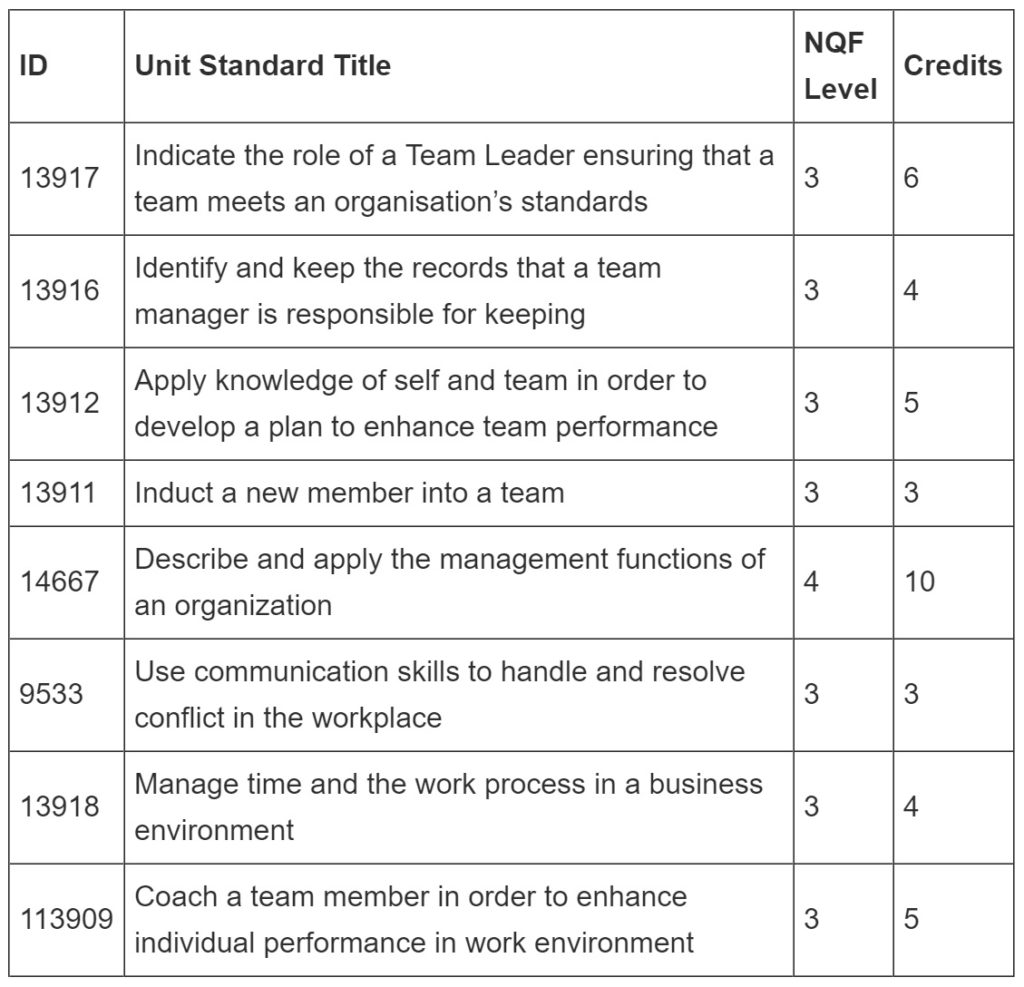Learning Outcomes
- Indicate the role of a Team Leader ensuring that a team meets an organisation’s standards
- Identify and keep the records that a team manager is responsible for keeping
- Apply knowledge of self and team in order to develop a plan to enhance team performance
- Induct a new member into a team
- Describe and apply the management functions of an organization
- Use communication skills to handle and resolve conflict in the workplace
- Manage time and the work process in a business environment
- Coach a team member in order to enhance individual performance in the work environment
Duration: 5 Days
Who Should Attend: Newly appointed or soon to be appointed staff supervisors or line managers who are looking for an introduction into the key principles of modern supervision practice
SAQA Alignment

Course Content
The management functions involved in a business
- Introduction
- Planning
- Organizing
- Directing (Leading)
- Controlling
- The short version to “Making decisions to solve problems”
- Assessing worker performance
Managing Yourself and Your Team
- Strengths, weaknesses and versatility of team members
- Versatility exercises
- Team Work
- What individual work is all about
- What teamwork is all about
- Requirements characterising a high performance team
- Vision (what to achieve)
- Measurable goals
- Leadership
- Co-ordination and initiative
- Ability to adjust
- Characteristics of effective teams
- The “destructors” of teams
- Teamwork in the environment
- The basic requirements for working together as a team
- Enhancing team effort
- Recognition and rewards
- How to Determine Key Performance Areas for
- Your Team
- How to determine KPAs & set job goals
- How to Agree Key Performance Areas (KPAs) With Your Team
- Conflict Resolution
Employee Induction (orientation)
Introduction
- Communicate the organization’s big picture
- Describe the unspoken company culture
- Share the routine details
- Outline the employee’s specific role
- Orient employees for success
Managing your Time
- Why Should You Manage Your Time?
- Managing Time – The Basic Procedure
- Ensuring That You Meet Your Job Goals
- General Time Management Tips
- Dealing With Interruptions
- Learn To Say No!
- Delegating
- Organise Yourself
- Monkey Management
Record Keeping
- Reasons for Keeping Records
- Type of Records Specific to the Team
- Record aspects of individual performance
The Coaching Process
- Definitions of Coaching
- Purpose of Coaching
- Benefits of Coaching
- The Principles of Coaching
- What Do You Need to Be a Great Coach?
- Coaching and Training
- Components of Effective Coaching
- The Structure of a Coaching Session
- Points to Consider for a Coaching Meeting
- Preparation
- Rephrasing and Paraphrasing
- Reflecting feelings
- Coaching Success Stories
Certification: Learners will have to complete the relevant assignments to qualify for the certificate of competence.
